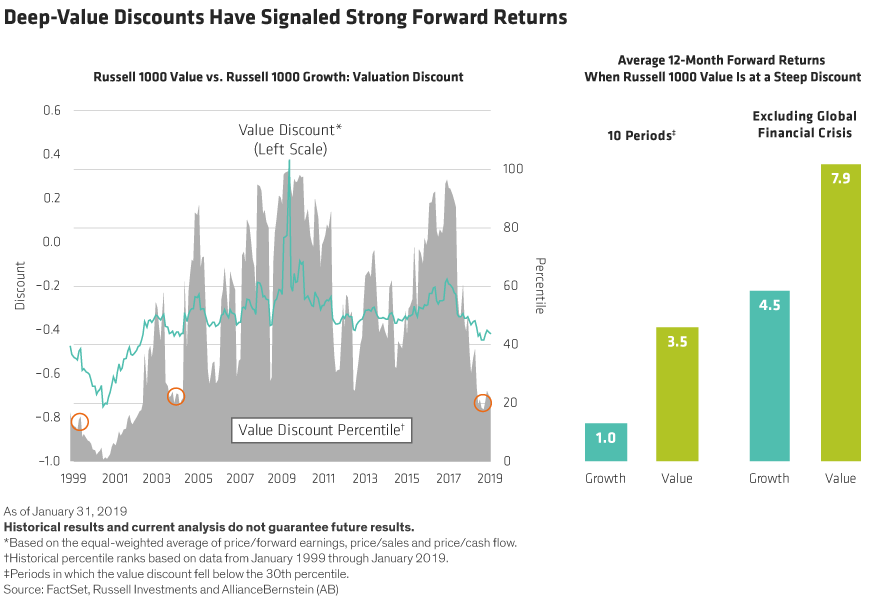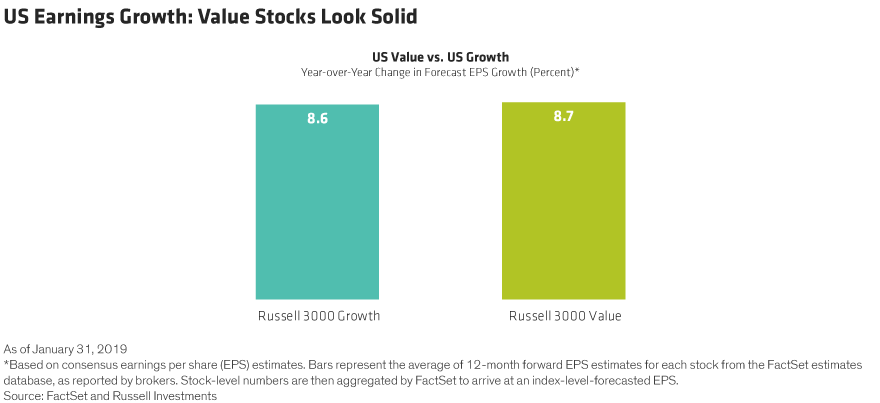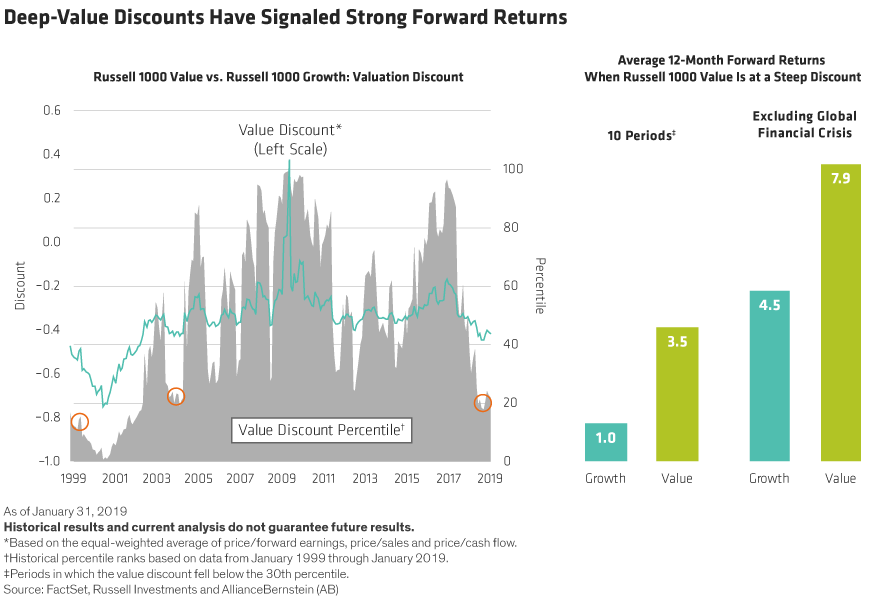Value investing has always been about challenging the consensus—but never more so than today. After several tough years, we’re seeing signs of a value recovery brewing. Yet fresh approaches are needed to capture the potential in today’s complex markets.
It’s been tough to make the case for value investing. In some ways, the classic discipline, made famous by Benjamin Graham in the early 20th century, seems as sensible as ever: buy undervalued stocks that are misunderstood because emotional investors make mistakes, and stay the course until their true worth is realized. Yet because value stocks have underperformed growth stocks since the end of the global financial crisis, investors have lost faith.
The numbers are daunting. Over the last 10 years, the Russell 1000 Value Index has trailed the Russell 1000 Growth Index by 3.5% annualized. Value stocks are generally perceived as riskier and have suffered from a growing anxiety about trade frictions, interest-rate uncertainty, volatile oil prices and threats to economic growth. Beneath the surface, however, we see promising signals.
Deep Value Discount: Threat or Opportunity?
To survey the landscape, we looked at the discount of value stocks versus growth stocks using several metrics. Our research suggests that the Russell 1000 Value traded at a 42% discount to the Russell 1000 Growth at the end of 2018, based on price/forward earnings, price/sales and price/cash flow. In a historical perspective, that discount is exceptionally large, ranking at roughly the 20th percentile of all months over the past 20 years.

Skeptics might argue that the discount is justified. Sometimes, stocks are cheap because companies face real threats to their business and earnings potential. Perhaps value stocks are so much cheaper than growth stocks today because in a tougher macroeconomic environment, investors believe that growth stocks offer some immunity from a slowdown and value stocks are vulnerable.
We disagree for several reasons. While the economy faces real risks, we think value stocks have already priced in a macroeconomic scenario that is much more dire than reality.
What’s more, many companies with attractively valued stocks have strengthened their balance sheets and reduced costs, while improving margins and free cash flow, which means they’re in better shape to cope with weaker economic conditions than is widely perceived.
Our research indicates that value stocks aren’t fundamentally weak today. In fact, last year, earnings growth forecasts for US value stocks rose at a similar pace to US growth stocks across the market (Display). In other words, investors don’t have to settle for low-quality, highly indebted or terminally declining companies to access attractively value stocks.

From Airlines to Communications
Strong fundamentals and attractively valued stocks can be found in a range of industries, unlike after the global financial crisis, when opportunity was heavily concentrated in deep-value financial stocks. For example, valuations of US airline stocks are currently very compelling amid concerns that passenger numbers may drop if the economy slows. Yet after years of consolidation, domestic load factors have risen steadily from about 74% in 2004 to 85% in 2017, meaning planes are flying with many fewer empty seats than in the past. Select airlines, such as Alaska Air Group, have also lowered costs and enjoy dominant positions in niche routes, which should help the company do well, even in tougher times.
In many cases, cheap stocks don’t reflect strong underlying fundamentals. Shares of Comcast, the communications group, have faced pressure as investors frowned upon its takeover of UK satellite TV provider Sky for an enterprise value of $49 billion last September. Concerns are also growing about the sustainability of TV subscribers. Yet Comcast continues to show good earnings growth and free cash flow, driven by tight spending controls and its improving broadband business, which continues to gain new subscribers.
What Could Prompt a Rebound?
Still, for value stocks as a group to deliver better results for investors, market sentiment needs to change. We believe that the current environment is actually a classic value opportunity. Many investors have an exaggerated fear that a recession will depress earnings dramatically for value stocks, which has pushed valuations down to extremely low levels. Some cheap companies are clearly vulnerable to a slowdown. But for select companies that are properly positioned, the worst earnings nightmare is unlikely to come true, and these stocks could ultimately deliver much better performance than expected, in our view.
Active Positioning Is Essential
Even if a value rebound materializes, the road to recovery won’t be smooth. Volatility is likely to persist. And companies of all stripes are facing multiple risks.
That’s why investors need to be selective. Passive value portfolios based on simple valuation metrics don’t scrutinize individual companies. To identify undervalued companies that can withstand external pressures, investors need to look closely at balance sheets, cost structures, management teams and, most importantly, cash flows as indicators of company health. Multi-dimensional valuations metrics—earnings, sales and cash flows—are essential to understanding the true value of a business. And identifying clear catalysts for a company to rebound can help reduce the danger of falling into “value traps.”
Reports of the death of value investing are greatly exaggerated, in our view. Nobody can say when the cycle will shift in favor of value stocks again, but we believe that today’s pent-up return potential could lead to extremely attractive results for patient investors. By being mindful of the current risks in the market and using multiple lenses to gauge valuations, we think investors can gain the confidence to reallocate to disciplined value portfolios based on traditional contrarian stockpicking.
The views expressed herein do not constitute research, investment advice or trade recommendations, do not necessarily represent the views of all AB portfolio-management teams, and are subject to revision over time.
Copyright © AllianceBernstein













